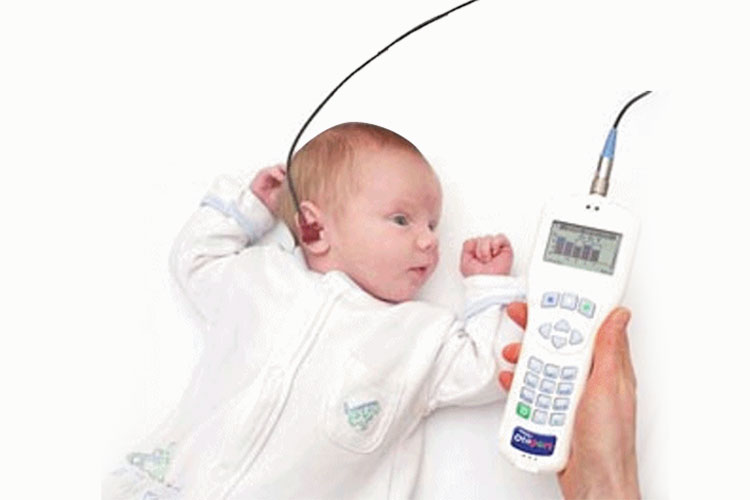Even if babies pass the hearing test in the newborn period, hearing loss may develop in the future, especially in those with risk factors. For this reason, it is beneficial for parents to closely monitor their children’s hearing and speech development and to apply to our hospital if they have concerns.
How is ABR/BERA Test Done?
Auditory Brainstem Behavior (ABR/BERA) test is the most valid electro-physiological method that is objective, that is, does not require the baby’s participation, and is widely used in audiological diagnosis. It can usually be performed on newborn babies in their natural sleep. It is performed under sedation for babies and older children who cannot do this in their natural sleep. ABR procedure does not cause any harm or hurt to the baby. A special audio stimulus is sent through small electrodes placed on the baby’s forehead and behind the ears and headphones attached to the ears, and the response of the auditory nerve to the stimulus is recorded and hearing thresholds are determined.
If babies who are healthy and have no risk factors for hearing loss fail the screening test three times, the ABR test is applied. Babies who have been in the neonatal intensive care unit or have other risk factors for hearing loss should be evaluated with ABR in addition to the screening test.
Bera Hearing Screening Test in Babies with Risk Factors
Family history of hereditary, childhood-onset hearing loss
Babies born before the 35th week
Babies with birth weight less than 1500 grams
Infections such as measles, rubella, syphilis, CMV, and toxoplasma during the mother’s pregnancy
Developmental abnormalities in the baby’s face and head, auricle and ear canal
Increased levels of jaundice in the blood that require transfusion
Being connected to a lung breathing machine for more than 5 days
Hearing loss with other findings suggestive of a syndrome
Type 2 neurofibromatosis and neurodegenerative disorders
Cleft palate, cleft lip deformities
What You Need to Know About Bera Test
First of all, ABR/Bera tests do not cause any harm to your babies. Because the procedure has no radiological effect.
It does not contain any application that will hurt your baby. There are no cuts or knife marks.
Bathe your baby 1 (one) day before your appointment at our hospital. In the meantime, take care to clean the ear and forehead parts.
The Bera test process can be repeated even for sensitive sounds. For this reason, it is recommended that you leave your baby sleep-deprived on the day of the appointment, apart from his daily routine sleep.
Before starting the procedure, clean your baby’s skin again before going to sleep. (Forehead and Ear Area)
If you have previous hearing tests, you can bring them with you.
What to do if my baby fails the hearing test?
30-40% of babies fail the first hearing test. Reasons why babies fail the first test include the presence of fluid in the middle ear or narrowness of the external auditory canal. If the baby does not pass the first test, the screening test is repeated one week later. If it still fails, it is repeated once more after two weeks.
If the baby fails the screening test three times, a detailed hearing evaluation is performed with SCANNING ABR (BERA), an advanced audiological examination.

